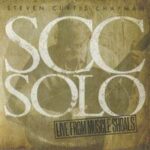REVIEWS: Steven Curtis Chapman and Phil Wickham

‘Living Hope’ from Phil Wickham looks inward and is a contrast to latest effort from Steven Curtis Chapman. Both artists, one new and one legendary, approach Christian music in different ways for different reasons.
As always, Phil Wickham’s beautiful vocals and passionate heart for Jesus are on full display for his 7th studio album, Living Hope. While there are several songs that lyrically and musically retread what has been done many times before (“Christ Is Risen,” “How Great Is Your Love”), overall Living Hope is a pleasant listen with a mix of songs for personal and corporate worship. Noteworthy tracks include “Eyes Fixed,” “Tethered” and the already widely successful title track.

How does an artist stand out from the crowd? What can an artist say that hasn’t already been said? Although the classic lament that there is nothing new under the sun stands true today, an artist can still shine by applying their own special something to a style of music that few, if anyone, can replicate.
Worship veteran Phil Wickham understood this more than anyone. His stunning falsetto made him instantly recognizable and his music was similarly beautiful. Songs such as “You’re Beautiful,” “Cielo,” and “Mercy” established Wickham as one of the best songwriters in the genre and Cannons remains one of the most splendid worship records of the 2000s.
Enter Living Hope, Wickham’s seventh full-length studio project and the first to be co-written with a host of other popular names, including Bethel’s Brian Johnson (“Living Hope”) and Passion’s Kristian Stanfill (“How Great Is Your Love”). Living Hope is Wickham’s most congregationally friendly release to date and although this means that it is easy  to sing along with, it’s also, sadly, filled with recycled melodies and lyrics. Musically, Living Hope continues to follow the a music trend that is best forgettable.
to sing along with, it’s also, sadly, filled with recycled melodies and lyrics. Musically, Living Hope continues to follow the a music trend that is best forgettable.
The songwriting and production sound so disappointingly artificial that the record simply does not come across as anything more than an impersonal product for the masses. Although bright moments surface on occasion, such as the lush pop number “Till I Found You” and the beautifully stripped back “Tethered,” the body of songs they are a part of is so tediously homogeneous that it’s challenging to draw out specifics.
As someone who once heralded Phil Wickham as one of the best artists in the worship industry, a record such as this disappoints. Wickham’s gorgeous falsetto is rarely given a chance to shine, the music is a direct replica of his previous effort, and the lyrics utilize metaphors that have been used in worship music since its inception. Outside of congregational use, there is little to come back to, which caused me to ask who was it made for. Was it made for the people who sing it or was it made for the God who hears it? As a listener, I cannot help but feel as though Wickham, and modern worship music in general, has turned its focus inward and away from the One who truly matters.
–By Chris Smith
Chapman helps listener ‘remember God in all things’
Steven Curtis Chapman
SCC Solo: Live From Muscle Shoals
Christian Contemporary music figurehead Steven Curtis Chapman has twenty albums, five Grammys, and a record  fifty-eight Dove Awards to his name. As one of the biggest names in the industry with millions of record sales, his music has ministered to countless people over the past thirty years. His newest venture, a recording of his memory-fueled solo tour, manifests most clearly in the new single, “Remember to Remember.”
fifty-eight Dove Awards to his name. As one of the biggest names in the industry with millions of record sales, his music has ministered to countless people over the past thirty years. His newest venture, a recording of his memory-fueled solo tour, manifests most clearly in the new single, “Remember to Remember.”
“Remember to Remember” is the thesis statement of this outing: to exhort reflection on God’s shaping of our lives. Steven presents a miniature autobiography through his past songs and various anecdotes. The world “Solo” in the title of the album is completely literal. Chapman’s entire set is simply himself and an acoustic guitar. Rather than sounding empty or hollow, being instrumentally confined in this way creates a setting of intimacy that never feels inadequate for the intended emotional needs of a song. Revisiting these classic songs is much more than just a hit of nostalgia — they fit the thematic concept of the entire endeavor. Not only do they serve as a storytelling mechanism for Chapman’s life, these tunes are the personal soundtrack of many, evoking individual instances of God’s providential working.
With a catalogue spanning that many albums and years, inevitably some favorite songs may have been left off of the setlist, and that is genuinely disappointing. Also, the album loses some of its relistenability due to certain monologues becoming annoying after multiple listens. However, these blemishes ultimately do not detract from the message of the album or hurt the experience of the initial few playthroughs.
Listening to this album, you get the experience of reliving some of Christian music’s classics and hanging out with their author. This participation in history is heartwarming and encouraging in all of the intended ways. Steven Curtis Chapman utilizes his catalog to help the listener do what he has been reflecting on for the past few years — remembering God in all things.
–Mike Knip






